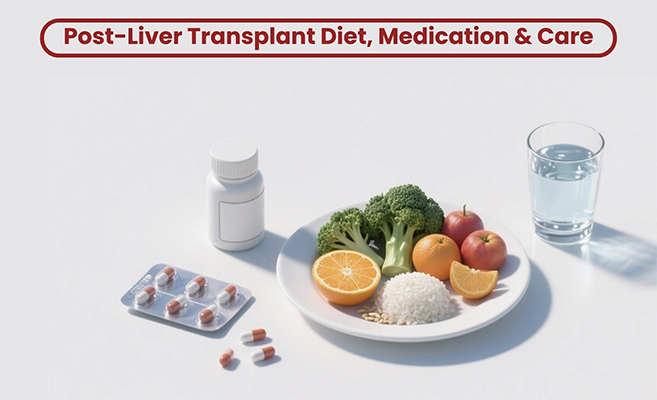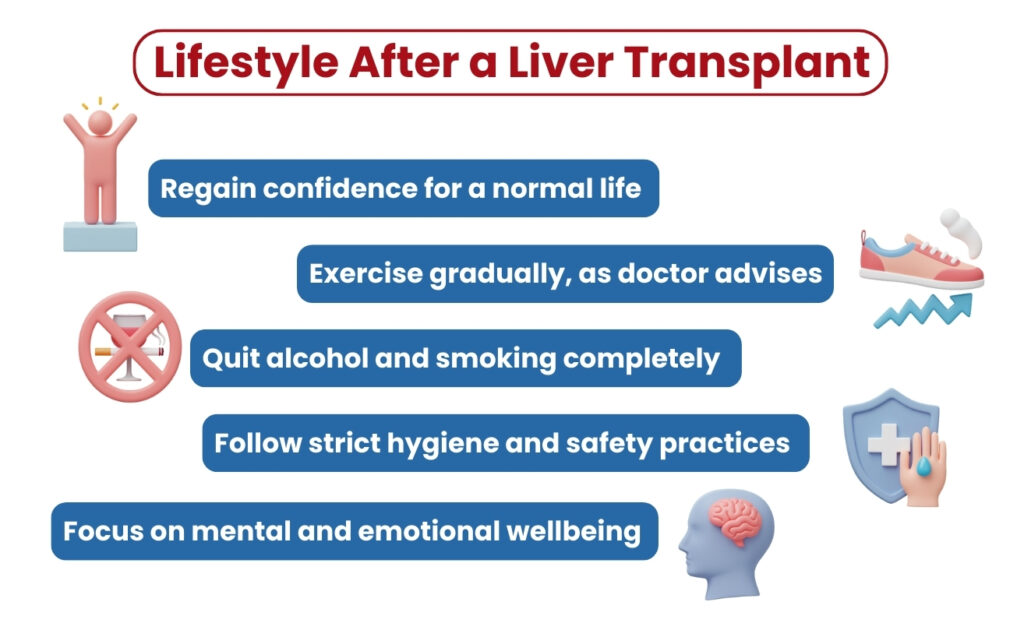Post-Liver Transplant Care: Diet, Medication and Follow-Up

Post-Liver Transplant Care: Diet, Medication and Follow-Up is the key to making a transplant truly successful. The surgery gives a patient a second chance at life but care after transplant is just as important. It’s about protecting the new liver, preventing rejection and regaining strength for the future.
Everyday habits like eating the right food, taking medicines on time and following up with doctors for regular tests can make a big difference in recovery. At PSRI Hospital, a multispeciality hospital in Delhi, our multidisciplinary transplant team helps patients with diet, medication and lifestyle changes to ensure safe recovery and lasting health. With expert care, patients can reduce infection risks, prevent organ rejection and enjoy long-term wellness.
This blog covers the essentials of post-liver transplant diet, medication and follow-up. Let’s explore the details and start your recovery journey.
Post-Liver Transplant Diet
Nutrition is the foundation of recovery and must be tailored carefully to protect the new liver:
- Healthy eating for liver patients: Choose lean proteins, whole grains, fresh fruits and vegetables to rebuild strength and immunity.
- Transplant diet restrictions: Avoid raw seafood, unpasteurised dairy, undercooked meats and outside/junk food to lower infection risk.
- Salt and sugar control: Limit sodium and processed sugars to manage blood pressure and diabetes, which are common after a transplant.
- Hydration: Drink clean, safe water but follow your doctor’s advice on how much is right for you.
Our dietary experts create customised post-liver transplant diet plans that not only speed up recovery but also ensure long-term transplant success.
Post-Liver Transplant Medication
Medication is the most critical support after a liver transplant. Patients must take prescribed medicines every single day, exactly as advised by their doctors.

- Immunosuppressive therapy: Prevents the immune system from attacking the new liver.
- Anti-rejection drugs: Essential for organ rejection prevention and must be taken at fixed times without delay.
- Medication adherence: Skipping doses or stopping medicines suddenly can lead to transplant failure.
- Managing side effects: Issues like high blood pressure, diabetes or kidney strain need close monitoring through regular patient monitoring and blood tests.
- Avoid drug interactions: Never start new medicines or supplements without consulting your doctor.
At PSRI Hospital, patients receive personalised counselling, regular monitoring and continuous guidance to ensure medicines are taken safely and effectively, helping them recover with confidence and protect their new liver for the long term.
Regular Follow-Up and Monitoring
Follow-ups are an important part of post-liver transplant care because they help doctors detect and treat problems early.
- Transplant follow-up schedule: Frequent visits in the first few months, which gradually reduce as recovery progresses.
- Patient monitoring and blood tests: Regular checks of liver enzymes, kidney function and medicine levels to ensure the new liver is working well.
- Vaccinations: Timely immunisations to reduce infection risk after transplant.
Every stage of follow-up is supported by accurate diagnostics, experienced specialists and personalised care at PSRI Hospital to ensure long-term transplant success.
Why Choose PSRI Hospital for Liver Transplant and After Care?
Rated 4.6★ on Google and 4.7/5 on Practo and trusted by 1,000+ liver patients, PSRI Hospital is recognised for its excellent results and compassionate care. Here is why it is known as the best liver transplant hospital in India:
- Expert transplant team: A group of liver specialists, surgeons and critical care doctors with over 30 years of combined experience.
- Proven success: Hundreds of successful liver transplants with high survival rates, treating patients from India and abroad.
- Latest technology: Modern 3D laparoscopic systems, advanced imaging, modular operation theatres and dedicated ICUs designed for liver patients.
- Super speciality hospital in Delhi: A trusted centre for complete care in liver diseases, gastroenterology, cancer treatment and other transplants.
- Personalised care: Support with diet plans, medicines, counselling and patient education at every step of recovery.
- International services: A dedicated desk to guide overseas patients with visa, travel, stay and follow-up care.
Book Your Appointment for Liver Transplant Care at PSRI Hospital Today!
Looking for safe and trusted liver transplant care in Delhi? Call +91 84 84 84 84 17 or use the “Book Appointment” form on our website to meet our experts.
At PSRI Hospital, a super speciality hospital in Delhi, we provide complete support with a safe post-liver transplant diet, daily medication guidance and regular follow-up check-ups. Our care helps lower infection risks, prevents organ rejection and ensures long-term recovery.
Start your recovery with confidence at one of the best liver transplant hospitals in India. Book your appointment at PSRI Hospital today and move towards a healthier future.
FAQs
Q1. Will my original liver disease come back after a transplant?
Ans. In some cases the disease that caused your liver failure may be the cause of the new liver to eventually fail again. But we apply a program that includes medicine carefully selected for each patient together with lifestyle changes aiming at reducing this possibility to the minimum.
Q2. What signs should I watch for that mean rejection or infection?
Ans. Some of the symptoms that are considered warning signs are fever, yellow eye, or skin, dark urine, unusual tiredness, or pain in the belly. If any of these appear, get in touch with your doctor at once.
Q3. How soon can I return to normal activities and work?
Ans. You may do light activities even a few weeks after surgery but in general, 3 months are needed for people to return to work. Depending on one’s overall health, full recovery may take 6-12 months.
Q4. Are there foods or substances I must always avoid?
Ans. Absolutely. Alcohol should never be consumed. Raw or undercooked foods, grapefruit and unpasteurized dairy products may also cause problems. Ask your doctor if it’s okay to eat any new food.
Q5. What happens if I miss a dose of my anti-rejection medication?
Ans. A new liver would be at risk if even one dose is missed. So do not waste time, call your doctor for the next step. DO NOT ever stop or change the doses on your own.

 Book An Appointment
Book An Appointment Virtual Consultation
Virtual Consultation





